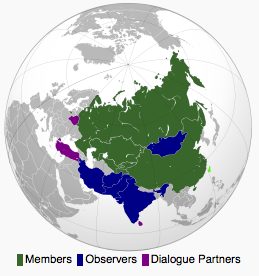Shanghai Cooperation Organization (SCO): The Indian Standpoint – Analysis
By IPCS
By Teshu Singh
The SCO is a permanent intergovernmental international organization formulated in 2001 in Shanghai by Kazakhstan, China, Kyrgyzstan, Russia, Tajikistan and Uzbekistan. India has an observer status in the Shanghai Cooperation Organization (SCO) along with Pakistan, Iran and Mongolia. The External Affairs Minister, SM Krishna, visited Beijing (6-7 June 2012) to represent India at the Summit of Heads of States of the SCO. Talks were also held between India and China on the sidelines of SCO to review the bilateral ties. The article seeks to examine the relevance of SCO for India and how Sino-Indian ties can be strengthen further vis-a-vis SCO.
What is the relevance of the SCO for India?

S. M. Krishna highlighted an array of significant issues like the changing situation in Afghanistan, terrorism in the region, connectivity among the SCO member states and energy cooperation during the summit.
SCO can provide a promising alternative regional platform to discuss the rapidly changing Afghan situation. Under the evolving global scenario, it is pertinent for India to take a long-term view of the strategic significance of associating itself with the SCO. Towards this end, India has already committed over US$ 2 billion for reconstruction and developmental activities in Afghanistan. The main focus of SCO is to combat three evils in the region terrorism, separatism and extremism. Regional Anti Terrorist Structure (RATS) a permanent acting agency of SCO coordinates the agencies of SCO members on dealing with these three evils. India is quite appreciative of the greater cooperation within RATS as an ‘important regional answer to this challenge.’
SCO states account for almost one-third of the world’s population. The issue of connectivity between SCO countries therefore becomes crucial. India is ready to cooperate with regional countries in an endeavor to build bridges between Central and South Asia. This is further exemplified by the Indian interest in re-energizing International North-South Transport Corridor launched in 2000 (the route connects Mumbai in India, Bandra Abbas port in Iran and another port known as Bandar Anzali in northern Iran on the Caspian Sea coast- from Indian perspective, this route is shorter than the existing Suez Canal and the Mediterranean Sea). This route will help India to bypass Pakistan to reach Central Asia.
India is looking for energy cooperation in the region and the TAPI (Turkmenistan-Afghanistan-Pakistan and Iran) project can give India a strategic link in its extended neighborhood and South Asia. However, there are a number of reasons why this initiative might not see the light of the day – the pipeline passes through a conflict ridden region and post 2014 the stability in this region may worsen, the economic cost of the pipeline may be more than estimated and India’s share of piped gas may not be enough to satisfy the projected need. Also, India is increasingly looking to Central Asia for its energy security needs. The energy rich Central Asian countries will help India reduce its dependence on Iran for its energy needs.
At this juncture an organization like the SCO has strategic importance for India. It is an organization outside the sphere of influence of the US and its allies (although Russia and China largely define the agenda of the organization). Thus India is pitching for enhanced role in the SCO. India is already engaged with the SCO countries in areas such as IT, management and entrepreneurship development. However, India will have to be cautious as to what extent it desires to participate in an organization in which China and Pakistan also play a significant role.
India, China and the SCO
The first interaction between Li Keqiang (who is expected to succeed Wen Jiabao) and S M Krishna centered on the ‘bigger picture’ of improving bilateral ties in the light of leadership changes coming up in China. The leaders pledged to ‘boost pragmatic’ cooperation between the two nations. Given the geographical proximity of all SCO countries with Afghanistan, India and China can work together in Afghanistan within the framework of the organization.
It may be pointed out, that the summit comes at a time when Leon Panetta announced the deployment of 60 per cent of the US naval assets in the Asia-Pacific region. This has become a point of concern for Beijing. Ties between the US and its allies (South Korea and the Philippines) have been growing stronger. Recently, there have been frequent spats between China and Southeast Asian countries over the SCS dispute. China has promised US$10 billion worth of loan to member state of SCO to stimulate their economic development. Beijing, in its awareness of shifting geopolitics and strained relations is keen therefore on improving ties with India.
Teshu Singh
Research Officer, CRP, IPCS
email: [email protected]
